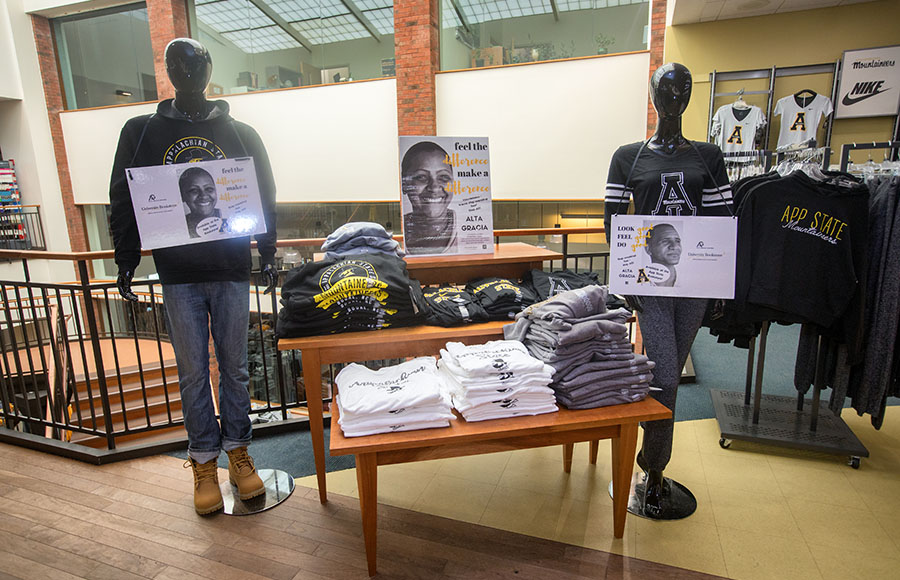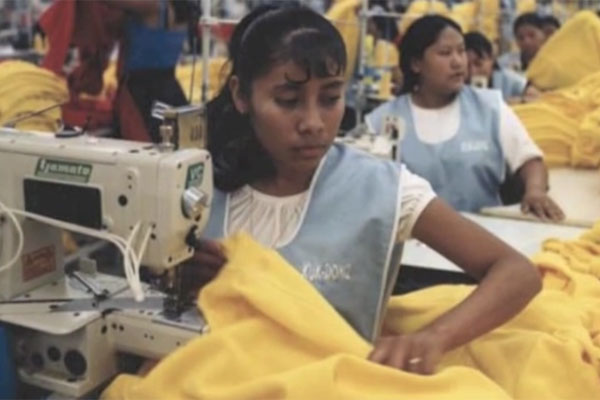BOONE, N.C. — Students in Appalachian State University’s chapter of United Students Against Sweatshops (USAS) worked with the University Bookstore and Office of Sustainability in spring 2018 to offer a line of collegiate apparel made by Alta Gracia, a Dominican Republic company known for offering its employees a safe, healthy workplace and a living wage.
The apparel is now being sold in the University Bookstore and reflects Appalachian’s commitment to sustainability, said Dr. Lee F. Ball Jr., chief sustainability officer at Appalachian.
“This move points out the importance of sustainability’s social equity aspect because it supports workers’ rights,” Ball said. “We all have an opportunity to make a difference, and I encourage people to think about that with their purchases.”
RELATED: The 3E’s of Sustainability
Mackenzie Morgan, a senior anthropology major from Charlotte, said that in championing the Alta Gracia line to Appalachian’s leadership, she and other USAS members were holding the university to its mission of creating engaged global citizens who understand their responsibilities in creating a sustainable future for all.
“The workers sewing clothing for our bookstore and athletes are an extension of our university, and thus, we work to ensure that they are free from the all-too-common abuses in the global garment industry, such as stolen wages, harassment or horrible working conditions,” Morgan said.
Trixie Wilkie, the bookstore’s marketing and visual merchandising manager, said her team listens to what students are passionate about and want to see in their bookstore, while also working in line with Appalachian’s sustainability mission.
“We have a wide variety of customers, and we’re always interested in looking for the best choice — whether that’s supporting local vendors, a fair-trade company or products made from organic cotton or recycled materials,” she said.
According to Alta Gracia’s website, the company was founded in 2010 as the first apparel factory in the developing world to pay a living wage and demonstrate full respect for workers’ rights. It pays more than three times the minimum wage and offers workers the right to a safe and healthy workplace and the right to form a union.
In addition to Morgan, other students involved in making the initiative possible include Cameron McKinley, Abbey Huber, Bailey Ferguson, Elizabeth Eppley, Eva Conrad, Rachelle Trouten, Ryan Wimberly, Casey Strout, Lauren Stander and Alaina Storch. Dr. Gregory Reck, who retired in spring 2018 from his position as professor in Appalachian’s Department of Anthropology, also helped spur the initiative.
About Sustainability and Energy Management at App State
Appalachian State University’s leadership in sustainability is known nationally. The university’s holistic, three-branched approach considers sustainability economically, environmentally and equitably in relationship to the planet’s co-inhabitants. The university is an active steward of the state’s interconnected financial, cultural and natural resources and challenges students and others think critically and creatively about sustainability and what it means from the smallest individual action to the most broad-based applications. The university offers both undergraduate and graduate academic degree programs that focus on sustainability. In addition, 100 percent of Appalachian’s academic departments offer at least one sustainability course or course that includes sustainability, and all students graduate from programs that have adopted at least one sustainability learning outcome. Learn more at https://appstate.edu/sustainability.
About Appalachian State University
As a premier public institution, Appalachian State University prepares students to lead purposeful lives. App State is one of 17 campuses in the University of North Carolina System, with a national reputation for innovative teaching and opening access to a high-quality, cost-effective education. The university enrolls more than 21,000 students, has a low student-to-faculty ratio and offers more than 150 undergraduate and 80 graduate majors at its Boone and Hickory campuses and through App State Online. Learn more at https://www.appstate.edu.
What do you think?
Share your feedback on this story.





![How NCInnovation Is Rethinking Economic Development in North Carolina [faculty featured]](/_images/_posts/2026/02/rethinking-economic-development-600x400.jpg)








